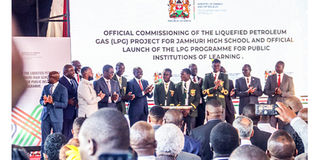Towards increasing LPG uptake in Kenya
Sponsored by State Department for Petroleum

President William Ruto and other government officials during the commissioning of the LPG programme for Public Institutions of Learning, on December 16, 2024.
By Hon Opiyo Wandayi, EGH
The official launch of theLiquefied Petroleum Gas (LPG) Programme for Public Institutions of Learningon December 16, 2024 at Jamhuri High School in Nairobi, represents a major step forward in implementing a Presidential directiveissued on February 24, 2023, and reflects Kenya’s collective commitment to delivering transformative energy solutions.
Jamhuri High School is among 20 public institutions selected for the pilot phase of this programme, which involves the installation of LPG infrastructure in learning institutions, by the State Department for Petroleum.
This programme is one of six initiatives under the Enhanced Liquefied Petroleum Gas Uptake Project (ELUP), which is aligned with the Bottom-Up Economic Transformation Agenda (BETA) of the Kenya Kwanza Government.
The Six LPG Initiatives under the National LPG Growth Strategy approved by the Cabinet on October 9, 2023 are:
- Development of Bulk LPG Import, Storage, and Handling Infrastructure;
- LPG for Households;
- Reticulation of LPG under the Affordable Housing Project;
- Review of LPG Policy and Regulatory Framework;
- Additional LPG Programmes, including Autogas; and
- The LPG Programme for Public Institutions of Learning.
The Ministry of energy and Petroleum is keen to increase LPG uptake through various policy interventions to ensure affordability, accessibility, safety and security across the LPG value chain. To enhance LPG uptake, the Government has introduced key policy measures, including zero-rating LPG, locally manufactured cylinders, and tanks, to lower costs and improve accessibility; and development of an LPG Open Tender System (OTS) to consolidate regional LPG requirements, ensuring quality and affordability.
Recognising the evolving LPG sub-sector, the Ministry has strengthened the policy, legal, and regulatory framework through initiatives like the National Petroleum Policy and revised Draft Petroleum (LPG) Regulations, 2024, currently awaiting clearance. The Ministry is also supporting the Kenya Bureau of Standards in formulating safety standards for LPG installations in learning institutions, prioritising the safety of learners and staff.
Implementing the National LPG Growth Strategy will bring notable benefits in health, safety, and environmental sustainability. They include improved respiratory health; reduced carbon footprint owing to LPG’s lower emissions; and progress towards achieving SDGs 3, 5, and 7: Good health and wellbeing, gender equality, and affordable clean energy.
However, realising these benefits requires robust financial support. I humbly request His Excellency the President to consider ring-fencing the Anti-Adulteration Levy (Ksh18 per litre of imported kerosene) to support the implementation of the National LPG Growth Strategy.
This programme presents an opportunity for partnerships with private sector players, including financial institutions, LPG importers, manufacturers, and suppliers. By working together, we can expand LPG usage, ensuring clean energy solutions that benefit all Kenyans.
We thank His Excellency the President for officiating the launch of the programme and for the steadfast support to transformative energy initiatives for Kenya’s development.
More information about this programme is available here.
____________________
Hon Opiyo Wandayi, EGH, is the Cabinet Secretary for Energy and Petroleum


